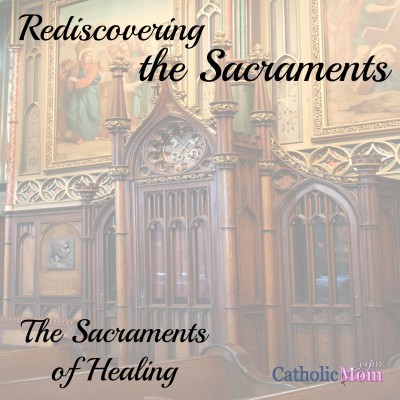Yesterday, we began a three-part series on the sacraments by defining what the sacraments are and delving into the three sacraments of initiation: Baptism, Confirmation and Holy Eucharist. Today, we’ll look at the sacraments of healing: Reconciliation and Anointing of the Sick.
The Sacraments of Healing
Reconciliation
The sacrament of Reconciliation is a sacrament of healing. As our Creator and Father, God fully knows our human needs. He knows that we get hurt and that we make mistakes. He knows that when we sin, it affects our souls, our bodies, our emotions, our relationships. Because of this, He wants to give us His merciful love, and He wants us to personally hear His words of forgiveness being spoken to us through the priest. Not just once, but frequently.
There are countless stories of confession and reconciliation in Scripture. One of my favorites is the “Woman at the Well” (John 4:1-42). I like it, because I can picture myself in the story. What Jesus does for this woman, He does for each of us during the sacrament of Reconciliation. Jesus meets the woman where she’s at, and He engages her in a conversation that is so personal and so loving, that she reveals her sinful past to Him. But He doesn’t turn away; rather, with love and mercy, He draws her even closer unto Himself. He loves her, even with all her failings and shortcomings. And through her encounter with Jesus, she is healed and transformed anew.
Like the woman at the well, Jesus meets us where we’re at, in what we’re struggling with, in the sacrament of Confession. And we walk out of the confessional healed and transformed anew, too.
It is a process to become a frequent recipient of the sacrament of Reconciliation, because it really isn’t the easiest sacrament to receive. For me, Confession wasn’t emphasized very much growing up. It wasn’t until my young adult years that I started to really understand its importance, and then it was still a process to becoming a more frequent recipient.
Lent is a wonderful time to begin making the Sacrament of Reconciliation a regular part of your life. It can be something as easy as putting a reminder on your Google calendar for the first Saturday of the month. To include your family, you can pick a parish that offers Confession before the Saturday vigil Mass, and then you can all go out for pizza after Mass. Doing this as a family can be a powerfully positive part of your spiritual journey together.
Anointing of the Sick
The other healing sacrament is Anointing of the Sick. In this sacrament, Jesus comes to strengthen us in times of weakness. He knows, from His own experience in the Garden of Gethsemani, that when we are suffering and feeling weak, it is hard to accept the Father’s will. So, He gives us strength to do so. Certainly, this sacrament is for the dying, that they may die a holy death. But we also can receive this sacrament under many other circumstances, such as undergoing a surgery, battling an illness, or even struggling with depression or anxiety.
When I was pregnant with my youngest child, Joseph, I knew I was going to have a C-section, so I made plans to go to my parish for the Anointing of the Sick. Well, Joseph was born early, before my sacramental appointment, so Father kindly came to the hospital after his birth and blessed me with the sacrament. The grace of the Anointing of the Sick helped me heal properly from my C-section and also gave me additional strength to take care of my other five children.
If you think you or a loved one has a need for this powerful sacrament, do not hesitate to call your pastor. Many parishes offer this sacrament at a monthly Mass, too, so you don’t even need an appointment.
Tomorrow, we will explore the last set of sacraments, the sacraments of mission: Holy Orders and Matrimony.
Copyright 2014 Sarah Damm
About the Author

Sarah Damm
Sarah Damm is a Catholic wife and mother of six children, living in Minnesota. She spends her days running errands, helping with homework, and keeping up with laundry and the family schedule. Sarah loves her faith, coffee, and good books. You can find out more about her at SarahDamm.com.



.png?width=1806&height=731&name=CatholicMom_hcfm_logo1_pos_871c_2728c%20(002).png)
Comments